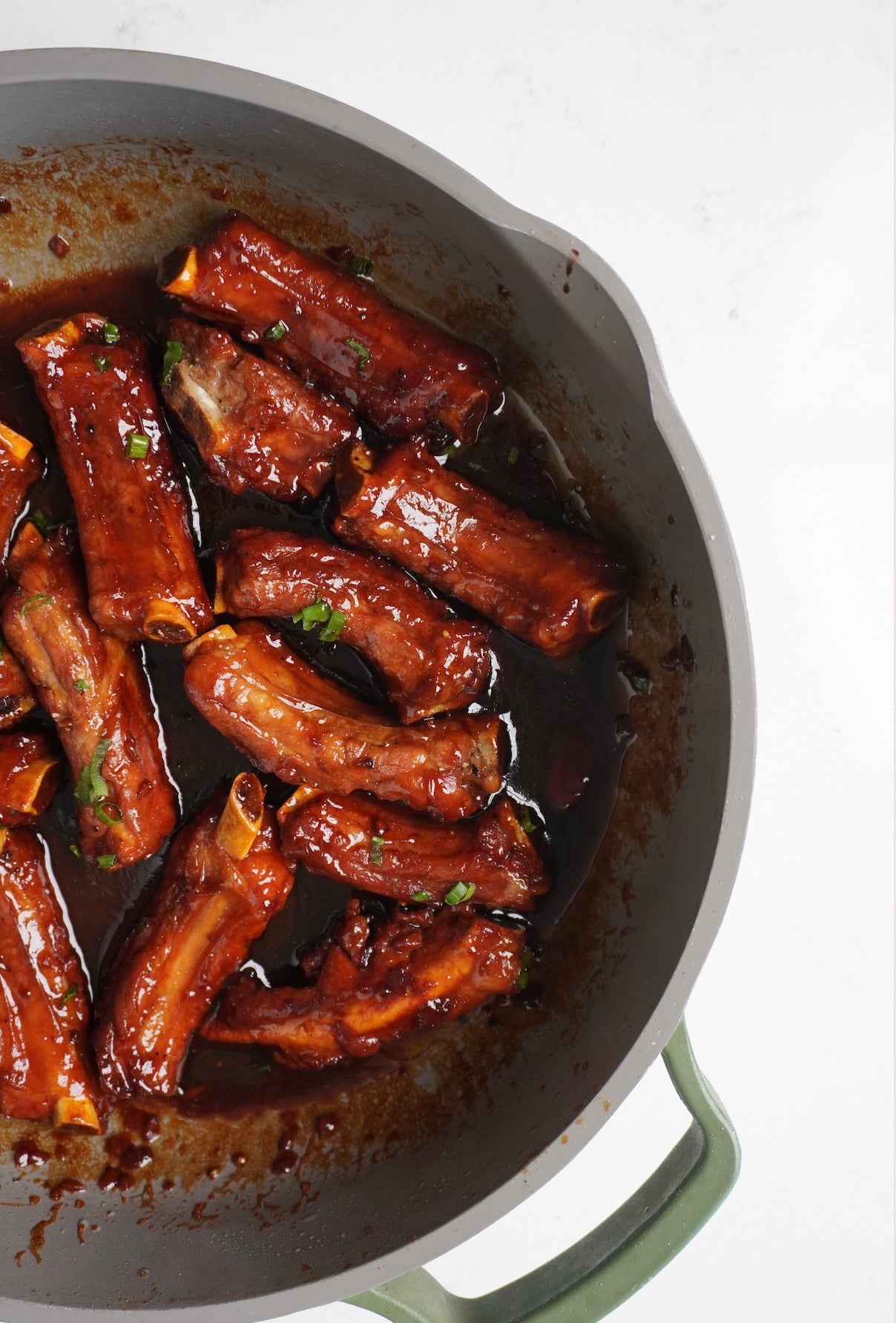

· By Sylvia Nguyen
Vietnamese Caramelized Pork Spare Ribs
Today we are making Vietnamese Caramelized Pork Spare Ribs (Sườn Ram Mặn). If you're after a dish that’s easy enough for a quick weeknight dinner yet impressive enough to earn you some bragging rights, you’re in for a treat!
This recipe's magic lies in its simplicity. Though the list of ingredients is modest, it’s the cooking technique that elevates it. By caramelizing the sugar and perfectly blending it with the sauces, then slow-cooking the ribs with the lid on, you'll end up with irresistibly tender ribs drenched in a thick, bold-colored sauce.
The "Kho" technique
The "Kho" technique is central to Vietnamese cooking. It primarily involves caramelizing sugar. Historically, this method helped in preserving food before the advent of refrigeration.
Process: Begin by melting sugar in a pot until it turns a deep amber color. It's a balancing act - too light, and you lack flavor depth; too dark, and it gets bitter.
Adding Flavours: Once caramelized, you usually add fish sauce, which gives a salty kick. This combo of sweet and salty creates the base for many dishes.
Dishes: This caramel base is used with meats, seafood, or tofu. They’re simmered until tender and flavorful. Think dishes like "Cá Kho Tộ" (caramelized fish) or "Thịt Kho" (braised pork with eggs).
Variations: Depending on where you're from in Vietnam or your family's own spin, the technique might vary. Some might go darker with the caramel, or add different ingredients like coconut water.
In essence, the Kho technique is straightforward but can create a wide array of rich and savory dishes. It's a staple in Vietnamese cuisine and for a good reason!
Making it my own
Now, if you're familiar with the classic version of Sườn Ram Mặn, you might observe that my sauce is a bit on the thicker side. It’s a personal touch that, in my opinion, amplifies the flavor and pairs divinely with steamed white rice. It’s so good that I often find myself licking my fingers to savor every drop!
Accompanying these ribs, I love serving a refreshing side of Canh – a traditional Vietnamese broth-based soup with boiled veggies, commonly bok choy. The slightly salty ribs combined with this light soup creates a balanced meal, making the food experience both delightful and digestible.
Ingredients (makes about 2-3 servings):
1.5 lbs of spare ribs
1 shallot
4 garlic cloves
4 tbsp sugar
2 tbsp fish sauce
1-2 tbsp oyster sauce
1/2 tsp chicken bouillon
1/3 cup coconut water/water
2-3 Thai chillis
Black pepper
Instructions:
1. Caramelizing the Sugar (KHO): Begin by caramelizing the sugar. Keep stirring until it melts entirely. Aim for a rich brown hue, but watch closely to avoid any burns, which could introduce a bitter taste.
2. Sautéing the Base: Sauté the shallots and garlic next until they release their aromatic essence.
3. Introducing the Ribs: Add the spare ribs followed by seasonings – fish sauce and oyster sauce. Toss them around to ensure they're well-coated and let them sizzle for a few minutes.
4. Slow-Cooking: Pour in the coconut water, followed by Thai chilis and a dash of cracked black pepper. Secure the lid and let it simmer on low heat for 20-30 minutes or until the ribs turn tender and succulent.
5. Final Touches: Finish off with some freshly cracked black pepper.
Serve/Plating:
Lay your ribs on a fluffy bed of steamed white rice. On the side, I've opted for a Canh made with dried shrimp, boiled bok choy, and a touch of miso paste – not wholly traditional, but oh so delicious! Finally, garnish with toasted sesame seeds and chopped scallions.
If you're not trying to impress a date, I suggest you ditch the chopsticks and go in with your hands like a savage. There's not better way to enjoy a dish like this :P.
Happy cooking! YOM.